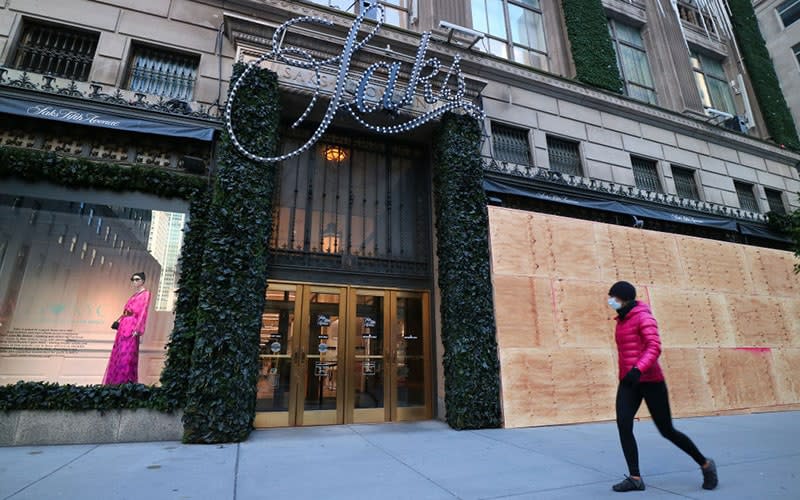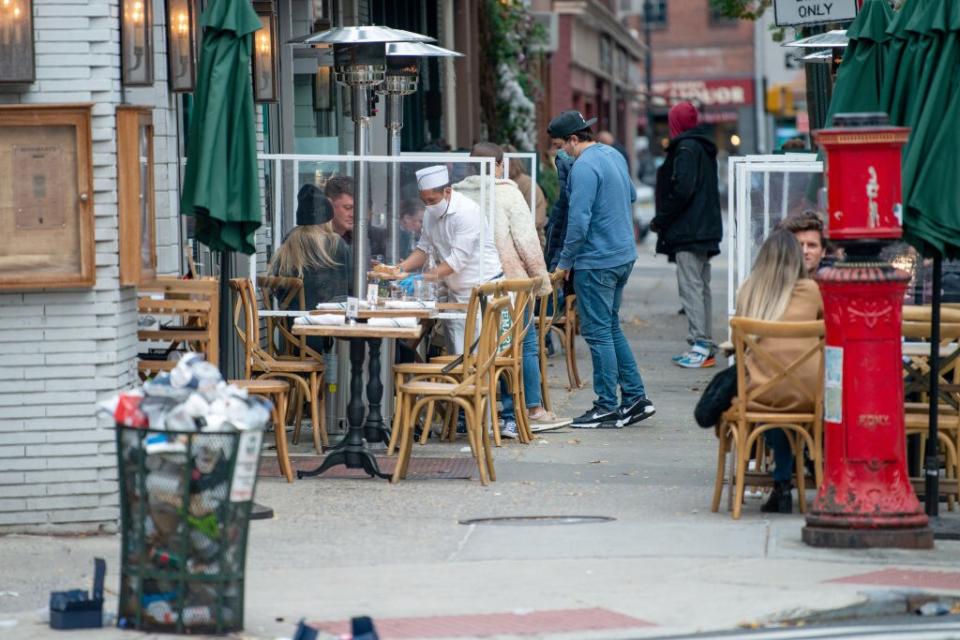'Fifth Avenue is a sea of plywood': A postcard from New York on election day

Presidential election day 2016 felt – initially at least – like a festival of feminist triumphs. Convinced that Hillary Clinton would be declared America’s first female president, here in New York – Clinton’s adopted home state – and all over my social media, mothers proudly took their daughters along to the polling station as they cast what they confidently assumed would be a historic ballot. Of course, it was historic, just not in the way many had hoped or anticipated.
Now, four years on, election day 2020 has a wildly different tone: sombre, strained, anxious and febrile. Not only are voters not confident about the result, but, thanks to the high number of postal votes this year, nobody is quite sure when any winner will be declared; it’s possible there won’t be a definitive result for days.
Meanwhile, across the city, businesses have spent the past few days boarding up their windows in readiness for civil unrest. Fifth Avenue is a sea of plywood, with Tiffany’s, Macy’s, Saks and other landmark brands firmly boarded up, while downtown, in SoHo, some stores and restaurants never removed the boards following the outbreak of violence and looting in the wake of the death of George Floyd in May.
But, now, even in my genteel neighbourhood of Brooklyn Heights, banks and shops have battened down the hatches, and apartment blocks have hired private security firms. The city’s police departments have reportedly run practice drills on various possible post-election scenarios, including violent clashes between Trump and Biden supporters, the appearance of an armed paramilitary group, a bomb or a cyberattack. The authorities are, they have said, preparing for anything.
Certainly, scenes have already been surreal. On Sunday, caravans of Trump-supporting motorists blocked bridges and highways in and out of the city, waving Trump flags and goading counter-protestors, who then clashed with police.

And, in a country that has struggled with political apathy in recent presidential races, this year’s turnout looks set to smash records. Before queues formed as the polls opened at 6am this morning, 100 million Americans had already cast their ballots early – over 72 per cent of the entire number of votes cast in 2016. In New York, early voting has coincided with monsoon-like conditions, which in no way deterred voters in this deeply, staunchly Democratic city; more than 1.1 million queued patiently, some for four or five hours, in the high winds and rain. The actor Paul Rudd earned a whole new local fanbase after handing out cookies to voters queuing in the rain outside Brooklyn’s colossal Barclays Centre.
But, for many of us, today comes with a heavy dose of political PTSD. Four years ago, having spent most of 2016 canvassing for Hillary, calling voters across the US from her Brooklyn HQ, I had tickets to her supposed victory party, at the sprawling Javitts Centre on Manhattan’s west side. It was 9pm when we realised it wasn’t turning out to be the walkover we’d been so smugly banking on – and there wasn’t even a bar. By the time we’d beaten our way downtown to a friend’s party – via a large order at the liquor store – the mood in their West Village brownstone was already verging on wake-like; Donald Trump had just taken the highly significant swing state of Ohio.

When, at 2.35am, the news channels reported that Hillary had called Trump to concede, we refused to believe it. Even when I finally caved in, Ubered tearily home, and crawled into bed at 5am, I was still holding onto the hope that things would be different when I woke up. That morning, having barely slept, on my way from Brooklyn into Manhattan, a young woman standing near me on the F train collapsed in tears. I instinctively put my arms around her, and she sobbed into my shoulder, as several other strangers joined us in a spontaneous group hug.
Tonight, nobody is planning any sort of victory party. Even if there were more confidence in a definitive Democrat win, New Yorkers are understandably scarred by being at the epicentre of coronavirus only seven months ago. In the final presidential debate, Trump called New York a ghost town, which certainly isn’t true, but the city is struggling to recover from the pandemic. Offices are still empty, restaurants are battling to survive, Broadway is shuttered until at least next summer, and Covid rates are rising again in hospitals.
When Obama won the presidency in 2008, New Yorkers danced with strangers in the streets across the city; tonight, in the unlikely event of a definitive, early Biden win, there might be a little dancing in living rooms. But, after four exhausting years of Trump, eight months of coronavirus and an election campaign that has seemed never-ending, most will simply breath a sigh of relief, then settle down for a very long sleep.

